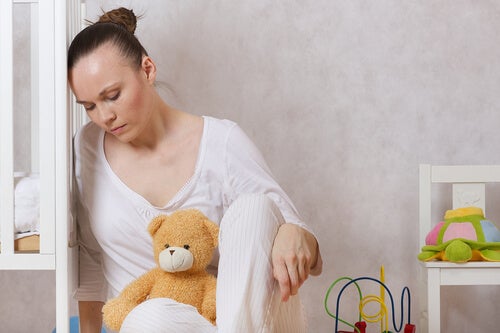Postpartum Depression - Why the Baby Blues?


Written and verified by the psychologist Sergio De Dios González
“I have a baby and can’t be sad.” Even though this phrase is about postpartum depression, such feelings are seldom associated with new mothers. However, they certainly torment a large number of them, even though they seldom express it. Pregnancy doesn’t always meet the expectations women had about it. Western society preaches a somewhat idealized and biased idea of pregnancy and mainly focuses on “the joy” produced by the arrival of a new family member.
Both pregnancy and the period after childbirth are moments of great vulnerability for women. They don’t only experience feelings of joy and happiness during this time, but also anxiety and depression. In fact, according to studies, between 10 and 25% of women become depressed after giving birth.

Breaking the taboos
Depression is a pathological alteration of mood, it decreases your motivation and increases your sadness. It usually presents along with vegetative, emotional, mental, behavioral, and vital rhythm symptoms that linger for at least two weeks.
Pregnancy is a stage of the high incidence of depressive disorders and puerperium is the period with the highest risk of depression in a woman’s life. At least according to Jadresic, the most frequent puerperal mental disorders are postpartum dysphoria, postpartum depression, and postpartum psychosis.
Postpartum depression doesn’t have a single cause but is a consequence of a combination of physical and emotional factors. Postpartum depression doesn’t happen because of something a mother does or doesn’t do. It happens because hormone levels (estrogen and progesterone) in women drop rapidly after they give birth.
The estrogen and progesterone sublevels generate chemical alterations in the brain that can cause mood swings. Also, many women can’t get as much rest as they should to fully recover from childbirth. Thus, the constant lack of sleep leads to physical discomfort and exhaustion, and these factors can definitely contribute to symptoms of postpartum depression.

The role of family and environment in postpartum depression
Family and friends are likely to be the first ones to notice symptoms of postpartum depression in a woman who just gave birth. This condition doesn’t only affect the person who suffers from it, but also her family nucleus. Of course, the quality of their relationships suffers.
This is why the people closest to new mothers must understand their state of mind. This is because they’re still happy about the birth of the baby but also depressed. The family of a new mother must let them know they’re there to help. The latter must know they can express how they feel without fear of being judged or misunderstood.
Thus, you must let them know they can express the emotions of the situation they’re going through. It helps them with their feelings of guilt. This is because understanding what’s happening to them is a turning point that can improve their situation. The whole family must show support in order to make a difference in the new mother’s mental state.
Final notes on postpartum depression
If your symptoms persist despite loving family support, you must seek professional help. The first step is for these mothers to understand that what’s happening to them is normal. That it’s linked to the acceptance of the emotions they’re experiencing, even if these are unpleasant. This is because they might be forcing themselves to feel good but both their body and mind are telling them the opposite. Thus, their situation worsens and only adds to the feelings of frustration.
Here’s a round of applause to those mothers currently struggling with postpartum depression and are yet keeping it together for their baby’s well-being!
“I have a baby and can’t be sad.” Even though this phrase is about postpartum depression, such feelings are seldom associated with new mothers. However, they certainly torment a large number of them, even though they seldom express it. Pregnancy doesn’t always meet the expectations women had about it. Western society preaches a somewhat idealized and biased idea of pregnancy and mainly focuses on “the joy” produced by the arrival of a new family member.
Both pregnancy and the period after childbirth are moments of great vulnerability for women. They don’t only experience feelings of joy and happiness during this time, but also anxiety and depression. In fact, according to studies, between 10 and 25% of women become depressed after giving birth.

Breaking the taboos
Depression is a pathological alteration of mood, it decreases your motivation and increases your sadness. It usually presents along with vegetative, emotional, mental, behavioral, and vital rhythm symptoms that linger for at least two weeks.
Pregnancy is a stage of the high incidence of depressive disorders and puerperium is the period with the highest risk of depression in a woman’s life. At least according to Jadresic, the most frequent puerperal mental disorders are postpartum dysphoria, postpartum depression, and postpartum psychosis.
Postpartum depression doesn’t have a single cause but is a consequence of a combination of physical and emotional factors. Postpartum depression doesn’t happen because of something a mother does or doesn’t do. It happens because hormone levels (estrogen and progesterone) in women drop rapidly after they give birth.
The estrogen and progesterone sublevels generate chemical alterations in the brain that can cause mood swings. Also, many women can’t get as much rest as they should to fully recover from childbirth. Thus, the constant lack of sleep leads to physical discomfort and exhaustion, and these factors can definitely contribute to symptoms of postpartum depression.

The role of family and environment in postpartum depression
Family and friends are likely to be the first ones to notice symptoms of postpartum depression in a woman who just gave birth. This condition doesn’t only affect the person who suffers from it, but also her family nucleus. Of course, the quality of their relationships suffers.
This is why the people closest to new mothers must understand their state of mind. This is because they’re still happy about the birth of the baby but also depressed. The family of a new mother must let them know they’re there to help. The latter must know they can express how they feel without fear of being judged or misunderstood.
Thus, you must let them know they can express the emotions of the situation they’re going through. It helps them with their feelings of guilt. This is because understanding what’s happening to them is a turning point that can improve their situation. The whole family must show support in order to make a difference in the new mother’s mental state.
Final notes on postpartum depression
If your symptoms persist despite loving family support, you must seek professional help. The first step is for these mothers to understand that what’s happening to them is normal. That it’s linked to the acceptance of the emotions they’re experiencing, even if these are unpleasant. This is because they might be forcing themselves to feel good but both their body and mind are telling them the opposite. Thus, their situation worsens and only adds to the feelings of frustration.
Here’s a round of applause to those mothers currently struggling with postpartum depression and are yet keeping it together for their baby’s well-being!
All cited sources were thoroughly reviewed by our team to ensure their quality, reliability, currency, and validity. The bibliography of this article was considered reliable and of academic or scientific accuracy.
- Jadresic E. Trastornos depresivos posparto. En: Correa E, Jadresic E, eds. Psicopatoiogía de la Mujer. Santiago: Editorial. Mediterráneo, 2005; 159-75
This text is provided for informational purposes only and does not replace consultation with a professional. If in doubt, consult your specialist.







